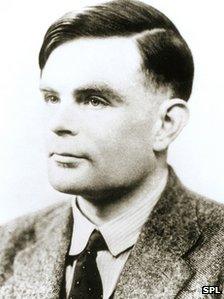MP calls for pardon for computer pioneer Alan Turing
- Published

A posthumous apology to Alan Turing was made by Gordon Brown in 2009
A Liberal Democrat MP has tabled a motion calling for "national hero" Alan Turing to be posthumously pardoned.
Manchester Withington's John Leech submitted the Early Day Motion and said people should sign an online petition protesting against Turing's conviction.
The gay computer pioneer was convicted for gross indecency in 1952, when homosexual acts were illegal in the UK.
Mr Leech said his persecution "by the state for being gay is a scandal that shouldn't be allowed to stand".
Alan Turing worked as part of the team which cracked the Enigma code at Bletchley Park in World War II and directed the computing laboratory at the University of Manchester, where he helped to form the basis for the field of artificial intelligence.
Two years after his prosecution, which saw Turing receive hormone treatment as punishment, he died from cyanide poisoning, which an inquest ruled was suicide.
Mr Leech's motion called for a recognition of the "vital contribution made by Alan Turing to Britain's war effort" and "regrets that following his years of national service he received a criminal conviction for having a sexual relationship with another man".
The MP said Turing was "a Manchester hero and a national hero" and people should sign the e-petition calling for Turing's pardon.
William Jones, who began the petition on the 10 Downing Street website in December 2011, said he was "very happy" that Mr Leech had submitted the motion.
"I urge all MPs to sign it - I urge everyone to sign my petition calling on Alan Turing to be pardoned," he said.
In 2009, the then Prime Minister Gordon Brown apologised for the treatment of Alan Turing, stating that his treatment, while being within the law of the time, was "utterly unfair" and "appalling".
- Published24 January 2012
- Published7 December 2011